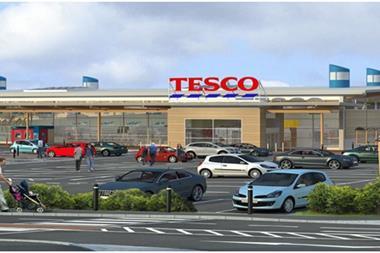Drastic action was expected from former Unilever boss ‘Drastic’ Dave Lewis and drastic action is what he has taken.

After years of aggressive sale and leasebacks to fund Tesco’s once rampant expansion programme, Lewis bought back 21 stores last week - having surprised, if not shocked, the industry in October with the admission the retailer actually owned just 53% of the space across its total portfolio, not the 70% widely assumed.
Most experts agree its £733m property swap with British Land is a win-win for both parties. Tesco needs to de-leverage both financially and operationally and reduce its eye-watering £1.4bn annual rent bill. So it made perfect sense to regain ownership of some of its stores, especially when it didn’t have to stump up any cash to do so.
Equally, it made perfect sense for British Land to focus on shopping centres and reduce its exposure to the underperforming supermarket sector, where the covenants are not quite the gilt-edged investments they once were (begging the question: will the big pension funds that have bought into supermarkets because of their long-dated, index-linked income follow suit?).
So with the supermarkets looking to retake control of their stores and landlords to offload, is the great tide of sale and leaseback activity we have seen over recent years finally receding?
Clive Black, head of research at Shore Capital Markets, certainly thinks so. “We believe that this is a threshold deal, confirming that a cycle of sale-and-leaseback activity, which arguably over-leveraged the supermarket sector, has come to an end, with the pendulum now swinging back,” he says.
Now the capital expenditure tap has been firmly turned off, Black expects the major supermarket groups to selectively explore further re-ownership activities to reduce operational leverage and the exposure to RPI+ rents. It would certainly be no surprise if Sainsbury’s explored the same course of action.
The one exception that might prove the rule is Morrisons, which only started fairly recently to pursue sale-and-leasebacks of non-core assets such as shopping centres, distribution centres and factories, although even that strategy may be revised in the wake of this week’s announcement of the departure of five senior managers, including Gordon Mowat, who only became group property and strategy director last September.
That said, there are downsides to reversing the sale-and-leaseback tide. In the British Land-Tesco deal, the former loses some rents, while the latter loses some equity in investments. For the supermarkets in question, there is also the small matter of the cost involved in buying back stores. There are only so many deals that can be done like the swap between Tesco and British Land. The reality is that where stores are under-performing and unlikely to see an improvement, retailers may instead have to run them for cash and let the leases expire or try to regear leases to open-market rents in exchange for longer leases and fewer breaks.
Tesco, which arguably went too far down the sale-and-leaseback road - and certainly further than most realised - would surely struggle to get to anywhere near the level of freehold ownership it once had. Not that it would necessarily want to.
Given that Tesco owns far fewer freeholds than previously thought, the optimum split between freeholds and leaseholds for the supermarkets is perhaps not what we assumed. In short, the sale-and-leaseback tide may be going out, but there is every chance it will not go out as far as we think.





























No comments yet